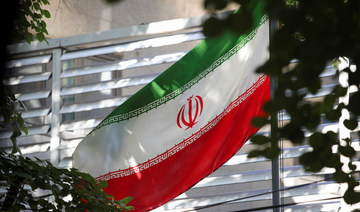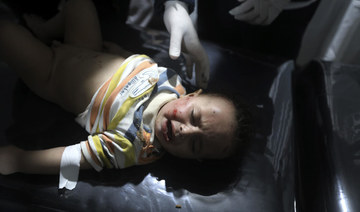TRIPOLI: The fight for control of Libya’s capital is depriving tens of thousands of pupils of their education, with high school students displaced by the violence fretting about their future.
“We’ve fallen behind... and I don’t even know where we will sit our final exams or how they will calculate my grades,” said Mayar Mostafa, a teenager in her last year of high school.
Mostafa said the fighting has forced her and her family to flee their home in a southern Tripoli suburb, while her school has shut its doors.
All this has left her “psychologically stressed out,” she lamented.
Mostafa is among those who are living in limbo — not knowing when they will be able to resume their studies to salvage the school year, or when life as a whole might return to normal.
On April 4, strongman Khalifa Haftar launched an offensive to seize the capital Tripoli and unseat the internationally-recognized Government of National Accord (GNA).
More than 75,000 people have been driven from their homes in the latest fighting and 510 have been killed, according to the World Health Organization.
More than 2,400 have also been wounded, while 100,000 people are feared trapped by the clashes raging on the capital’s outskirts.
Fighting between Haftar’s self-styled Libyan National Army and forces loyal to the GNA continues to rage south of Tripoli, and the UN envoy has warned of a “long and bloody war.”
Mostafa remembers the day the fighting erupted, saying she was woken by “the deafening sound of machine-gun fire and cannons.”
“We had to flee our home in the midst of a decisive school year,” she said.
“I was planning to go to university next year... Now I don’t know my fate.”
According to the UN’s agency for children, UNICEF, the fighting is “directly affecting some 122,088 children.”
“The academic year has been suspended in all schools in conflict-affected areas, and seven schools are currently sheltering displaced families,” UNICEF said last month.
It noted that an “attack on an education warehouse destroyed 5 million schoolbooks and national school exam results” in April.
In many schools classes are suspended because teachers have been trapped by fighting and are unable to reach work.
According to Rachad Bader, the head of a crisis cell set up by the Libya’s education ministry, “most schools in Tripoli have remained open,” despite the violence.
“But that is not the case for schools in Ain Zara and Abou Slim” in the southern suburbs of the capital, he said.
These “are the areas hardest hit by the military operations,” Bader added.
“I hope that the fighting will stop soon, otherwise we will have to look for alternatives for displaced children so that they won’t have to loose their school year,” he said.
The education ministry has given time off to teachers and students for the holy Muslim fasting month of Ramadan which began on May 6, hoping that by the end of that period fighting will have abated.
Meanwhile, in areas of Tripoli spared by the conflict, teachers have banded together to give free remedial classes during Ramadan to students displaced by the violence.
“It is generous on their part, knowing that they have sacrificed their Ramadan holiday to help us catch up,” said Mostafa, who along with 25 other students is taking maths classes.
“We are really grateful for their help in such difficult times,” she said.
But she is still afraid that she will not get good grades in her final exams.
English teacher Gofran Ben Ayad says the impromptu teaching initiative is key for the students.
“What is remarkable is that most of these students are brilliant and have shown that despite the psychological trauma they have suffered and their forced displacement, they are still able to learn,” she said.
Ahmad Bashir said he found out about the catch-up lessons through the Internet and “didn’t waste time” in registering for classes.
“My high school — the Khaled Ben Al-Walid in Ain Zara — has been closed for six weeks, and this is a decisive year,” he said.
“I don’t know what my future will be like after this war,” added Bashir, who like Mostafa is in his last year of high school.
He hopes the education ministry “will be understanding” in the timing of end-of-year exams, and take into account the plight of displaced students.
Displaced by conflict, Libyan students fear for their future
Displaced by conflict, Libyan students fear for their future
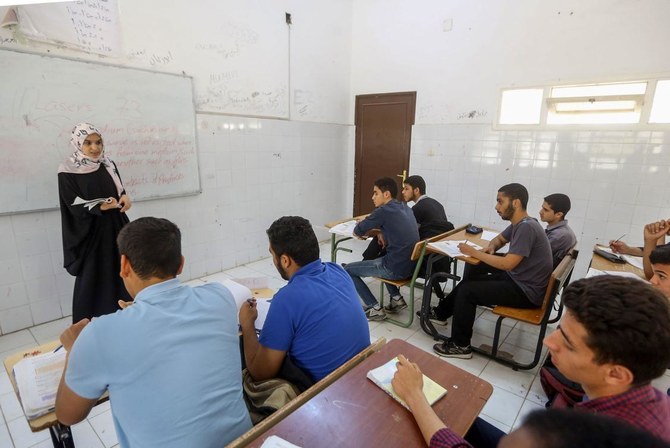
- “We’ve fallen behind... and I don’t even know where we will sit our final exams..." one high school student said
- More than 75,000 people have been driven from their homes in the latest fighting
New UK sanctions target Iranian drone industry
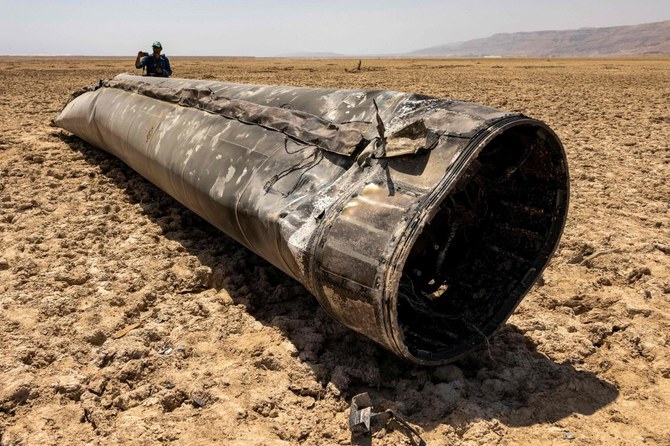
- The measures, taken in co-ordination with the US and Canada, target four businesses and two directors at a network of drone companies
LONDON: Britain on Thursday announced new sanctions targeting Iran’s military drone industry, in response to Iran’s drone and missile attack on Israel earlier this month.
The measures, taken in co-ordination with the US and Canada, target four businesses and two directors at a network of drone companies with the aim of limiting Iran’s ability to launch drones.
“The Iranian regime’s dangerous attack on Israel risked thousands of civilian casualties and wider escalation in the region,” British Foreign Secretary David Cameron said in a statement.
“Today the UK and our partners have sent a clear message – we will hold those responsible for Iran’s destabilising behavior to account.”
Britain also said it would introduce new bans on the export of drone and missile components to Iran, seeking to limit its military capabilities.
Last week, Britain imposed sanctions on Iranian military figures and organizations, in another coordinated move with the United States, following Iran’s action against Israel.
Iran launched drones and fired missiles at Israel on April 13 as a retaliatory strike for the attack on its embassy compound in Damascus two weeks prior, raising the risk of further escalation in conflict in the Middle East.
Egypt, Dutch leaders discuss Gaza ceasefire efforts

- Rafah assault ‘will have catastrophic consequences on regional peace and security,’ El-Sisi warns
- Egypt’s president and the Dutch prime minister agreed on the urgency of working toward reaching a ceasefire
CAIRO: Egypt’s President Abdel Fattah El-Sisi has discussed efforts to reach a ceasefire in Gaza with Mark Rutte, prime minister of the Netherlands.
During a phone call from Rutte on Thursday, the Egyptian leader warned that any Israeli assault on Rafah will have “catastrophic consequences” for the humanitarian situation in the enclave.
The leaders discussed bilateral relations, and ways to enhance cooperation across various political and economic levels consistent with the current momentum in Egyptian-European relations.
Ahmed Fahmy, presidential spokesman, said the call also focused on the situation in Gaza, and Egypt’s efforts to restore regional stability by reaching a ceasefire and providing access to humanitarian aid.
El-Sisi reiterated the crucial importance of ending the war, warning against any military operations in the Palestinian city of Rafah, which will have catastrophic consequences on the humanitarian situation in the strip and on regional peace and security.
The Egyptian leader underscored the need for the international community to assume its responsibilities to implement the relevant UN resolutions.
Egypt’s president and the Dutch prime minister agreed on the urgency of working toward reaching a ceasefire, and ensuring the flow of adequate humanitarian aid to all areas of the Gaza Strip in order to protect it from a humanitarian catastrophe.
They also emphasized the need to move toward implementing the two-state solution, which would restore regional stability, and establish security and peace in the region.
In March, El-Sisi received Rutte to discuss bilateral relations, regional developments, and Egypt’s efforts to reach a ceasefire and offer humanitarian assistance in Gaza.
Lebanon postpones local elections again as violence rocks south

- Lebanon is supposed to hold municipal elections every six years
- Parliament approved “extending the existing municipal and elective councils’ mandate until a date no later than May 31, 2025,” despite objections from lawmakers opposed to Hezbollah
BEIRUT: Lebanon’s parliament on Thursday delayed municipal elections for a third time in two years, state media reported, as militants in the country’s south exchanged near-daily fire with Israel for over six months.
The powerful Iran-backed Hezbollah group has been trading fire with Israeli forces across the border since the day after its Palestinian ally Hamas carried out a deadly attack on Israel on October 7, triggering the ongoing war in the Gaza Strip.
Lebanon is supposed to hold municipal elections every six years, but cash-strapped authorities last held a local ballot in 2016.
Parliament approved “extending the existing municipal and elective councils’ mandate until a date no later than May 31, 2025,” despite objections from lawmakers opposed to Hezbollah, said the official National News Agency.
The bill cited “complex security, military and political circumstances following the Israeli aggression on Lebanon” and especially its south, near the border, as reasons for the delay.
Lawmakers did not set a new date for the elections, initially scheduled for 2022.
Local councils help provide basic services to residents, but their role has declined as state coffers ran dry after Lebanon’s economy collapsed in late 2019.
Parliament Speaker Nabih Berri had previously said southern Lebanon could not be excluded from any upcoming ballot, after the Christian Lebanese Forces, the main party opposing Hezbollah, insisted on holding the polls on time.
More than 92,000 people have been displaced from their homes in Lebanon due to the violence, as have tens of thousands of residents of Israeli communities across the border.
Since violence began along the Israeli border on October 8, at least 380 people have been killed in Lebanon, including 72 civilians, according to an AFP tally.
Israel says 11 soldiers and eight civilians have been killed on its side of the border.
In April 2023, the Lebanese parliament had already postponed municipal elections as the deputy speaker warned holding them was “almost impossible” for the cash-strapped country after years of economic meltdown.
Lebanon has faced the prolonged financial crisis and months of border clashes essentially leaderless, without a president and headed by a caretaker government with limited powers amid deadlock between entrenched political barons.
Palestinian officials say Israeli forces kill teen in West Bank
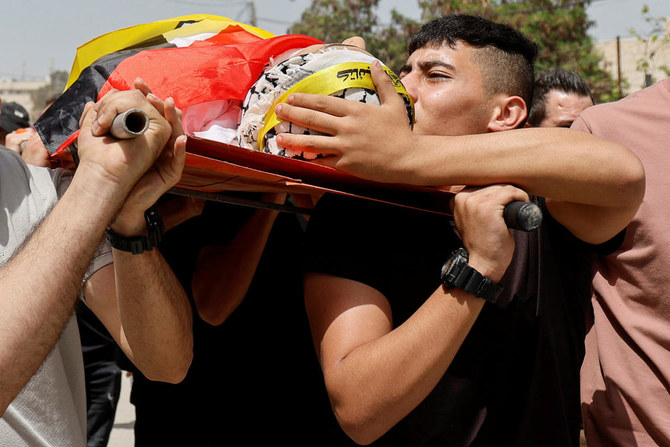
- Israeli police said “hits were identified” when forces responded to stone-throwing with gunfire
- The Palestinian health ministry said Khaled Raed Arouq was shot in the chest and “martyred by the occupation’s live bullets“
RAMALLAH, Palestinian Territories: Palestinian officials said Israeli forces killed a 16-year-old boy during a raid in the West Bank city of Ramallah early on Thursday.
Israeli police said “hits were identified” when forces responded to stone-throwing with gunfire but did not directly address the allegation.
The Palestinian health ministry said Khaled Raed Arouq was shot in the chest and “martyred by the occupation’s live bullets.”
Palestinian official news agency Wafa said Arouq died after being “shot by Israeli gunfire” early on Thursday morning.
Israeli forces carry out regular raids on towns and cities in the occupied West Bank and violence has soared in the Palestinian territory since the war in Gaza broke out on October 7.
Wafa said Israeli military vehicles stormed the city and “confrontations broke out between citizens and the occupation forces, who fired live bullets and stun grenades.”
It said Israeli forces were stationed in several neighborhoods and raided a house in Al-Bireh to the northeast.
Israeli police said: “Terrorists threw stones at the forces operating in the area, the forces responded with gunfire, and hits were identified.”
The police said they made several arrests and that Israeli forces did not suffer any casualties.
The army did not immediately respond to AFP’s request for comment.
Later on, Thursday, mourners carried Arouq’s body wrapped in the flag of Fatah, the political party of Palestinian president Mahmud Abbas, in his hometown of Jenin where he was buried.
“He was hit by a bullet in his back, which exited through his chest...They assassinated him in cold blood,” Majed Arqawi, cousin of Arouq, told AFP.
Wafa said Arouq’s father was an officer in the Palestinian military intelligence service.
Israel has occupied the West Bank since 1967 and at least 488 Palestinians have been killed by Israeli troops or settlers there since October 7, according to Palestinian officials.
At least 19 Israelis have been killed in attacks by Palestinians in the same period, according to official Israeli figures.
Hezbollah denies Israel claim it killed half of commanders in south
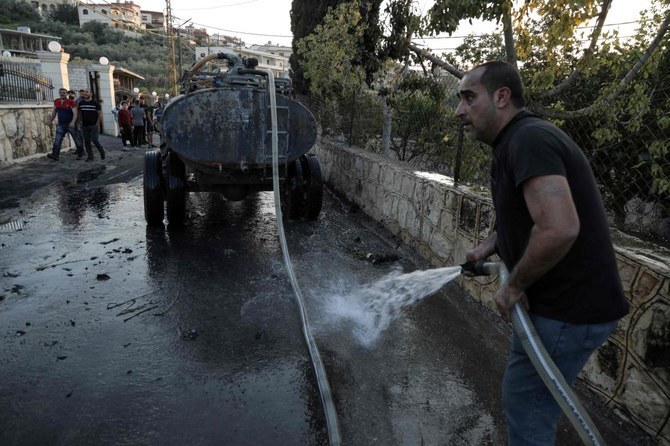
- The number of slain Hezbollah members who “hold a certain level of responsibility does not exceed the number of fingers on one hand“
- Gallant’s claim was “untrue and baseless”
BEIRUT: Hezbollah denied on Thursday an Israeli claim that it had killed half of the Iran-backed Lebanese group’s commanders in the south of the country, saying only a handful were slain.
The Lebanese group has been exchanging near-daily fire with the Israeli army since the day after its Palestinian ally Hamas carried out an unprecedented attack on Israel on October 7.
Israel’s Defense Minister Yoav Gallant said on Wednesday that “half of Hezbollah’s commanders in southern Lebanon have been eliminated” in the months of cross-border violence sparked by the Israel-Hamas war in Gaza.
“The other half are in hiding and abandoning the field to IDF (Israeli army) operations,” he added, without specifying how many.
A Hezbollah source who spoke on condition of anonymity rejected the claim.
The source told AFP that the number of slain Hezbollah members who “hold a certain level of responsibility does not exceed the number of fingers on one hand.”
The source said Gallant’s claim was “untrue and baseless” and designed to “raise the morale of the collapsed (Israeli) army.”
Israel has frequently claimed to have killed local Hezbollah commanders in targeted strikes, but the group has only confirmed a few were high-level members, referring to the rest as fighters in their statements.
Since October 8, the day after the Hamas attack on southern Israel, at least 380 people have been killed in Lebanon, including 252 Hezbollah fighters and dozens of civilians, according to an AFP tally.
Israel says 11 soldiers and eight civilians have been killed on its side of the border.
Tens of thousands of people have been displaced on both sides.
Both sides have stepped up attacks this week, with Hezbollah increasing rocket fire on military bases, while Gallant said in his latest remarks the army had carried out “offensive action” across southern Lebanon.
The Israeli military also said on Wednesday that it had struck 40 Hezbollah targets in Lebanon’s south.
Hezbollah leader Hassan Nasrallah has said his group had some 100,000 “trained” and “armed” fighters, but analysts say this number is likely inflated.








